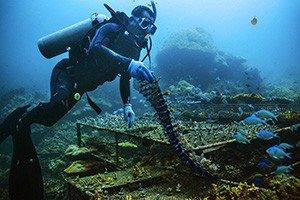Press Release Shim
Speeches Shim

For Immediate Release
Pohnpei, Federated States of Micronesia - The United States Agency for International Development (USAID) recently marked the completion of a partnership that has helped make coastal communities in Pohnpei, Federated States of Micronesia, more resilient.
In February 2015, USAID, through its Pacific-American Climate Fund, collaborated with the Marine and Environmental Research Institute of Pohnpei (MERIP) to implement the Diversifying Livelihoods of Fishing Communities in Pohnpei project. The partnership expanded sustainable small-scale aquaculture ventures among fishing communities with challenged livelihoods due to impacts from extreme weather variations and declining fish stocks.
“The U.S. government is proud to work with communities to make the most of their marine and coastal resources, and more importantly, to protect those most vulnerable who depend on these natural assets as they face their increasingly unpredictable future,” said U.S. Ambassador to the Federated States of Micronesia Robert Riley.
With the USAID support, MERIP trained and helped farmers to venture into sustainable farming of giant clams, sponges, and coral, which are well-established livelihoods in the region. The project also introduced rabbitfish farming as a new source of income for Pohnpei and as an alternative food supply. As a result, farmer beneficiaries earned as much as $200 additional income to support their families.
“The aquaculture activities supported by USAID and MERIP provide income to support our day-to-day needs, including food and electricity,” said Wanihda Alexander, a local farmer and beneficiary of the USAID grant.
Community members who participated in these aquaculture ventures also learned about sustainable management of coastal resources. The workshops provided by MERIP, through USAID support, helped four communities — home to approximately 3000 people — to complete practical environmental resilience activities, including water resource management, solid waste management, and mangrove clean-ups.
In the Pacific Islands, USAID partners with national governments to advance sustainable, resilient development. USAID assistance in the Pacific Island region covers 12 nations: Federated States of Micronesia, Fiji, Kiribati, Republic of the Marshall Islands, Nauru, Palau, Papua New Guinea, Samoa, Solomon Islands, Tonga, Tuvalu and Vanuatu.#

Comment
Make a general inquiry or suggest an improvement.